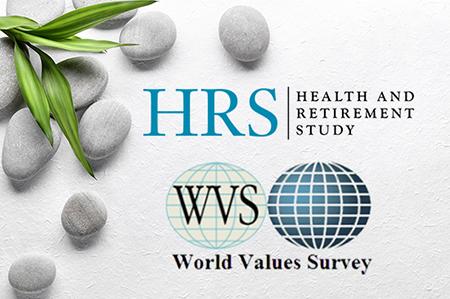January 2, 2019
Religiosity and Health
 A large set of research literature has shown that religiosity is associated with better health. The association can be attributed to several reasons: religious activities may promote social support, healthy lifestyles, and other psychosocial factors associated with better life outcomes.
A large set of research literature has shown that religiosity is associated with better health. The association can be attributed to several reasons: religious activities may promote social support, healthy lifestyles, and other psychosocial factors associated with better life outcomes.
In two recent papers, one published in the Journals of Gerontology: Social Sciences and the other in SSM Population Health, SRC researcher Mary Beth Ofstedal and her colleagues show that religiosity improves life expectancy in the U.S. They also show that the association between religiosity and health varies across countries with different social institutions around the world.
In the first study, they use the Health and Retirement Study to examine the effect of religiosity (measured in attitudes toward religion and religious service attendance) on life expectancy. In particular, because disability has an adverse effect on life quality, they also split total life expectancy (LE) into disability-free LE and disabled LE.
Distinguishing disability-free LE vs. disabled LE is an important contribution to the literature. While an increase in LE is favorable, it is even more so when it is accompanied by increases in disability-free rather than disabled LE. Ofstedal and colleagues show that, in the U.S. context, both positive attitudes toward religion and higher levels of participation are associated with improved LE, and most of the increase in LE is in the form of additional disability-free years. On average, a higher level of religiosity improves LE for near-elderly women more than men.
In the second study, the World Values Survey, which consists of data from 93 countries, is used to study whether the relationships between various measures of religiosity and health hold across different countries in a global context. Three measures of religiosity are utilized: participation (frequency of religious activity attendance), importance (the importance of god in one's life), and meaning (frequency that one ponders the purpose of life).
Ofstedal and her colleagues show that the relationship between religiosity and health varies across countries. For example, although participation is positively associated with health on average, the association is positive in some countries but negative in others. The relationship between importance/meaning and health also demonstrates substantial variation across countries. Furthermore, within the same country, the relationship often flips signs when one measure of religiosity is used versus another. Only three countries exhibit positive relationships between all three measures of religiosity and health.
To explore this variation in effects further, several indicators at the country level are introduced: country-level religious diversity, the country's restriction on religion, the country's human development index (HDI), and whether a country is or has been governed with communism. Results suggest that participation is more likely to be associated with better health in countries where there is a higher degree of diversity in religion. On the other hand, importance and meaning of religion is more likely positively associated with health in countries where there is a higher level of restriction on religion and/or a lower HDI. The relationship between religiosity and health is also more negative in current or former communist countries.
The authors speculate upon the reasons that lead to the variations in effect size across countries and measures. They argue that participation in religious activities is more likely to improve health where participation is voluntary. In countries where participation is not as voluntary, the salutary effect on health might be suppressed. Furthermore, in less developed countries (lower HDI) or where religion is constrained, stronger belief is more likely to be beneficial and hence improve otherwise difficult lives.
Mary Beth Ofstedal, Chi-Tsun Chiu, Carol Jagger, Yasuhiko Saito, Zachary Zimmer (2018). Religion, Life Expectancy, and Disability-Free Life Expectancy Among Older Women and Men in the United States. Journals of Gerontology: Social Sciences.
Zachary Zimmer, Florencia Rojo, Mary Beth Ofstedal, Chi-Tsun Chiu, Yasuhiko Saito, Carol Jagger (2019). Religiosity and health: A global comparative study. SSM – Population Health, 7: 100322.